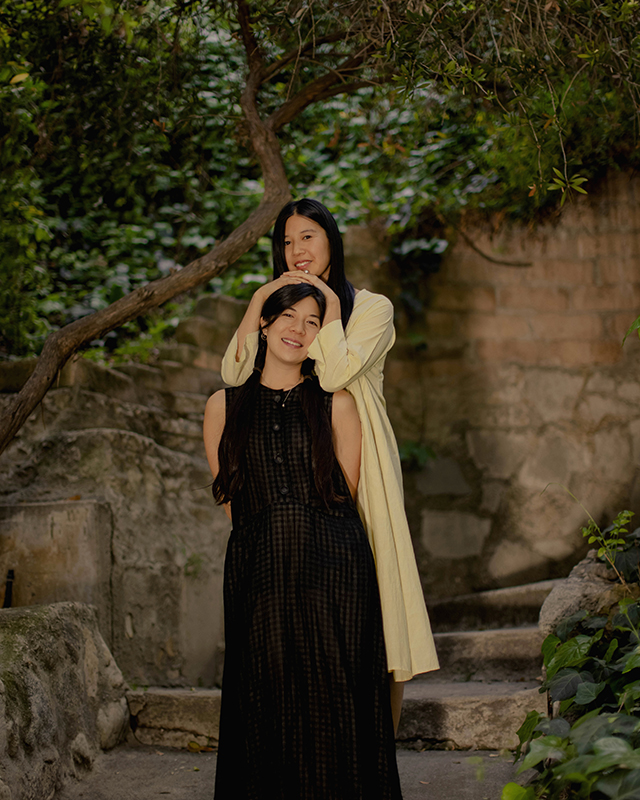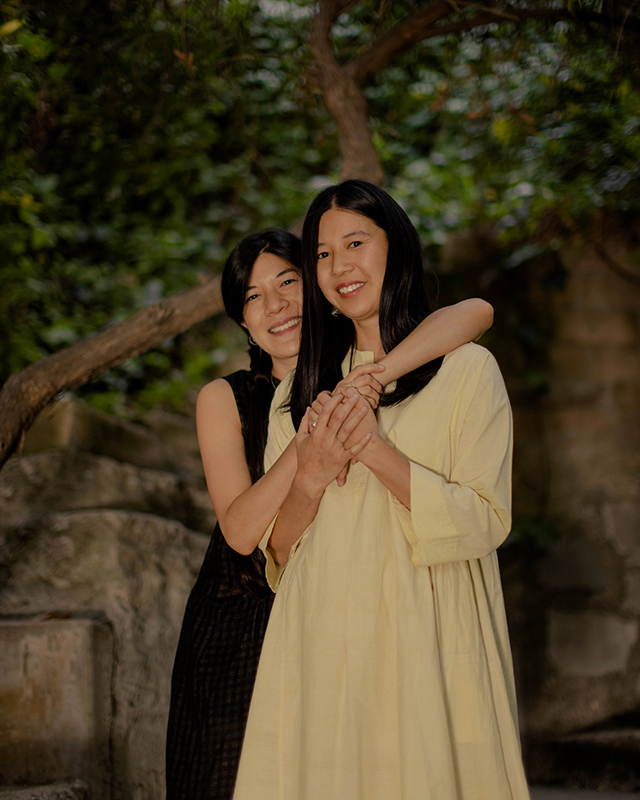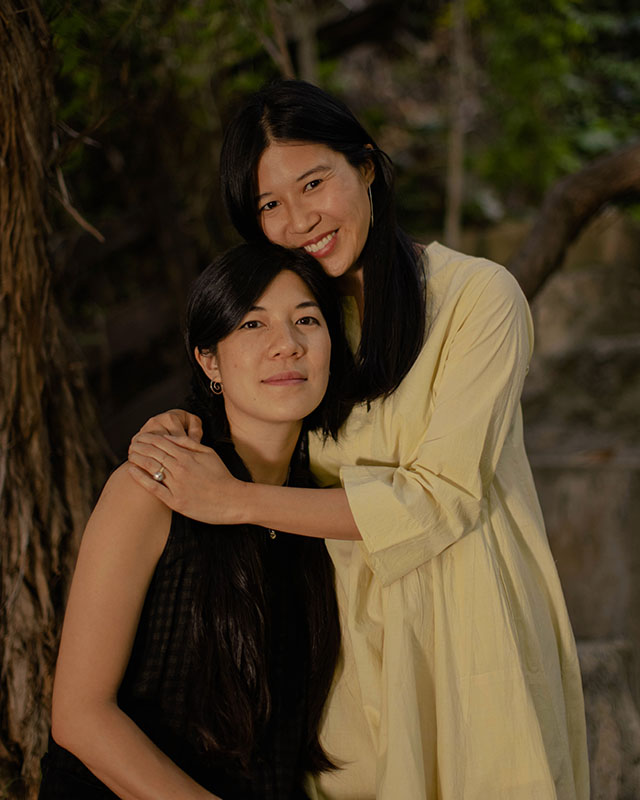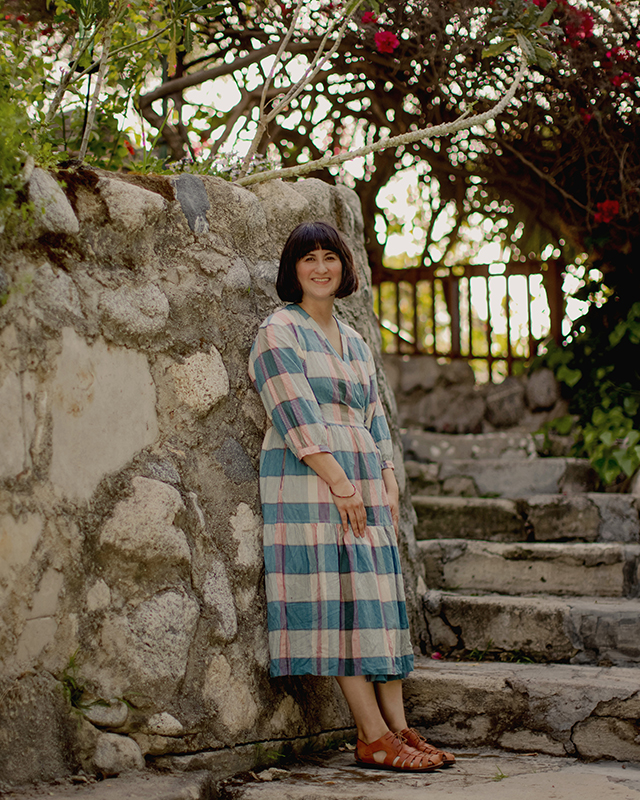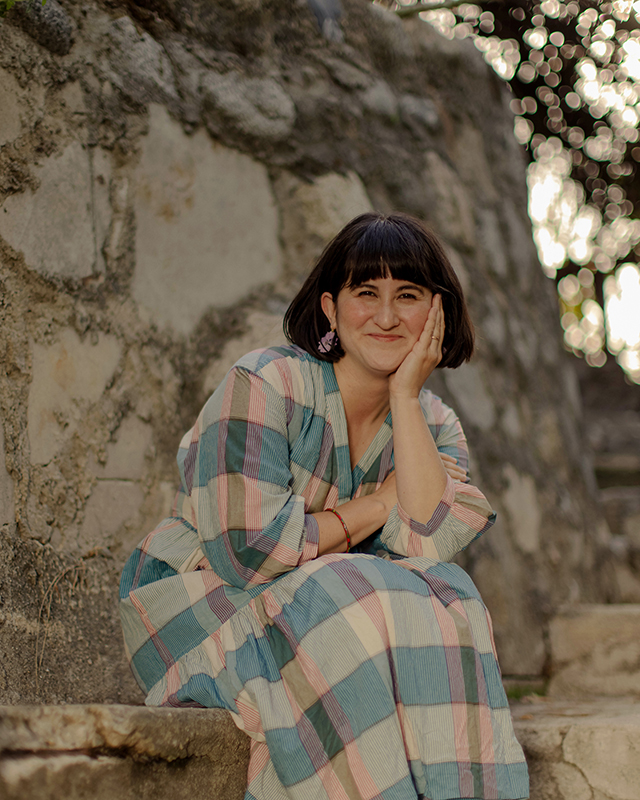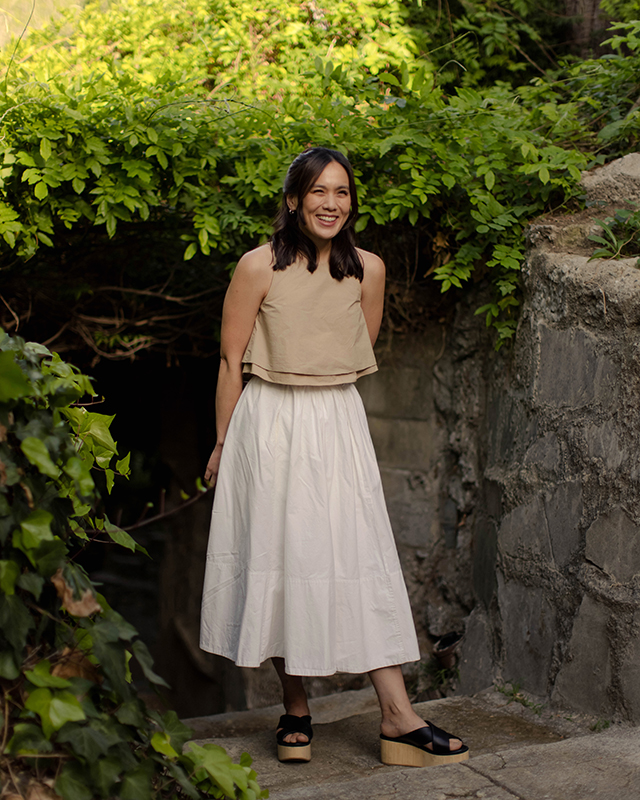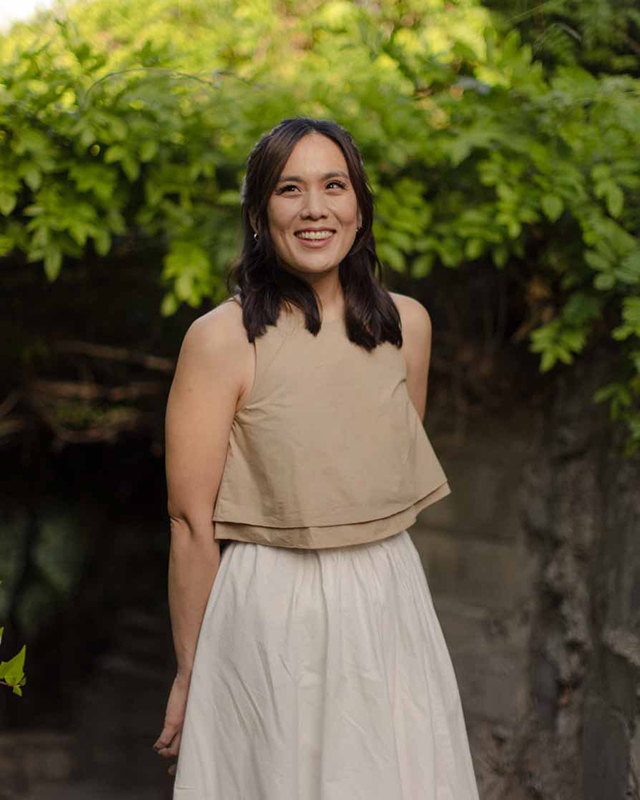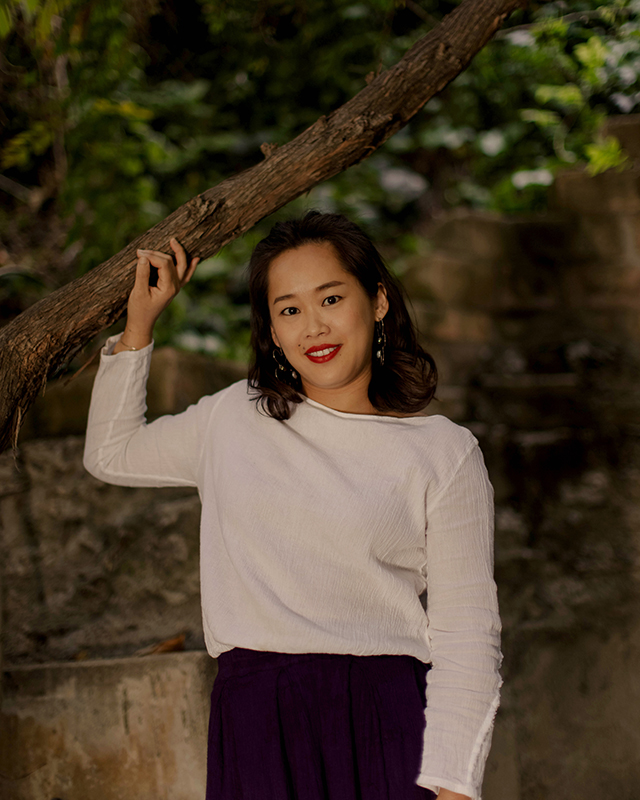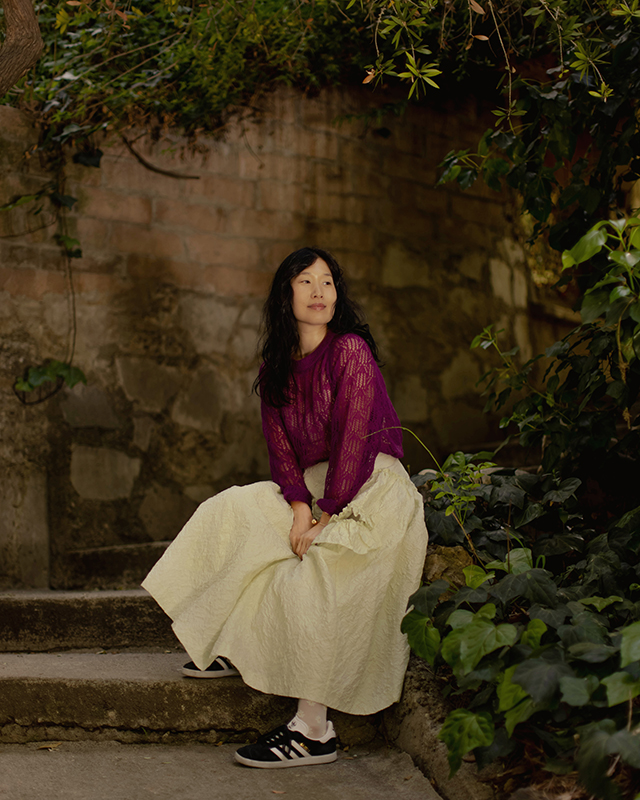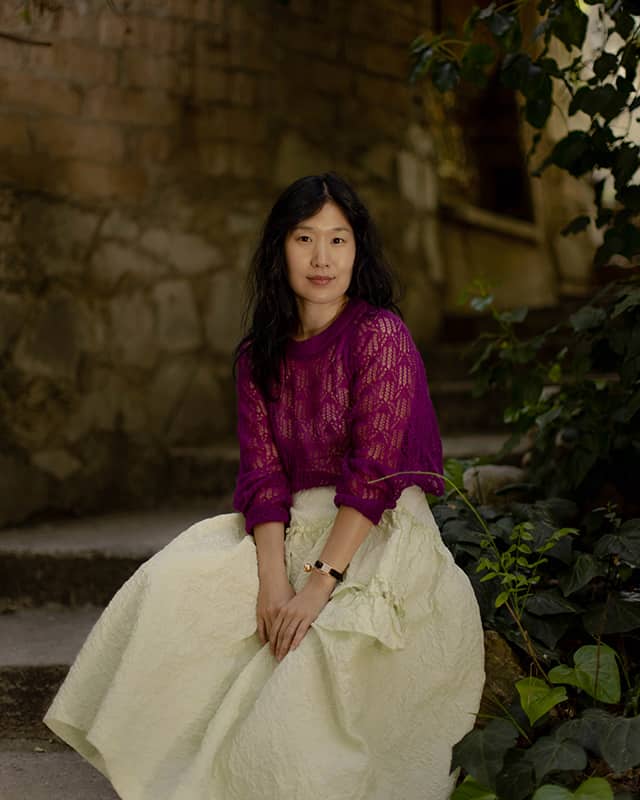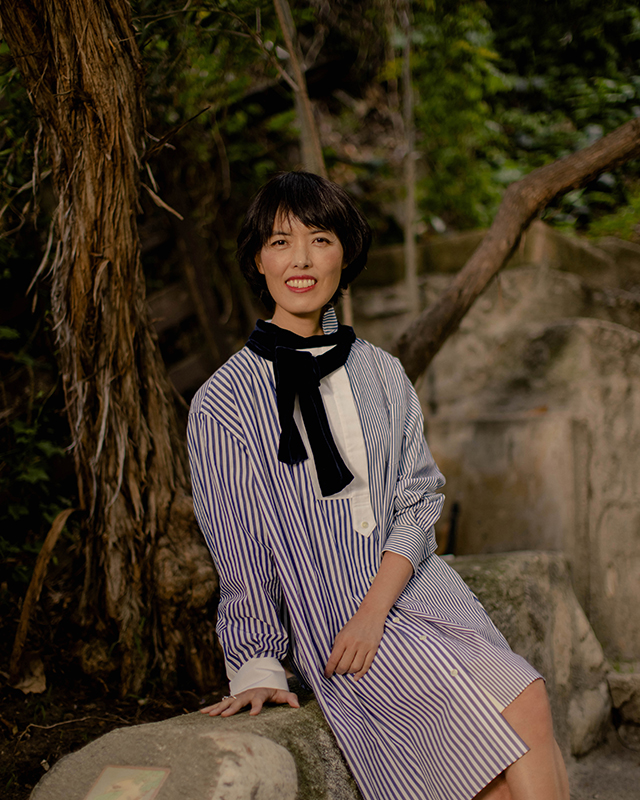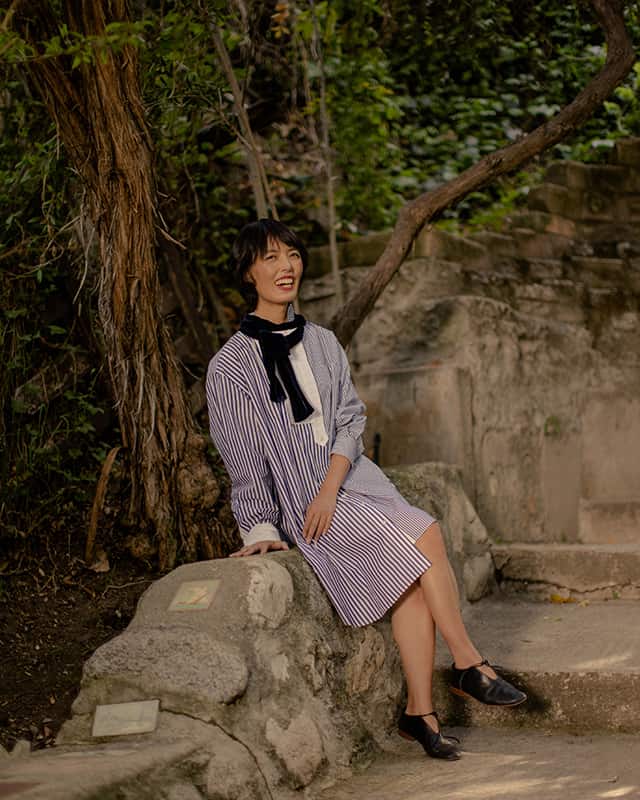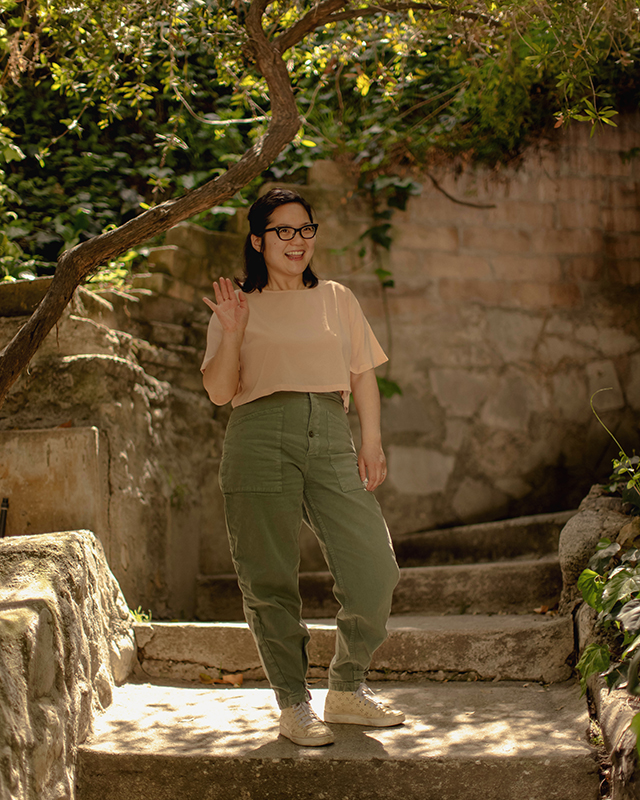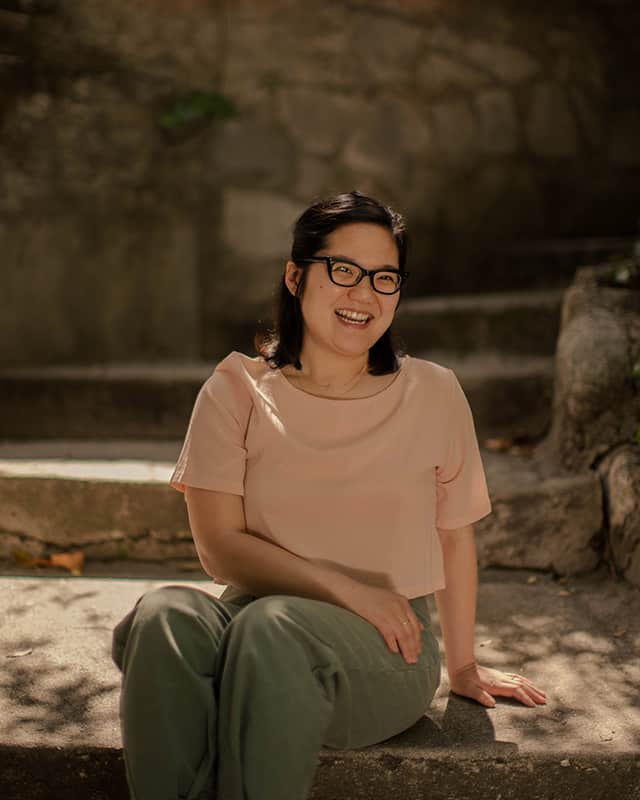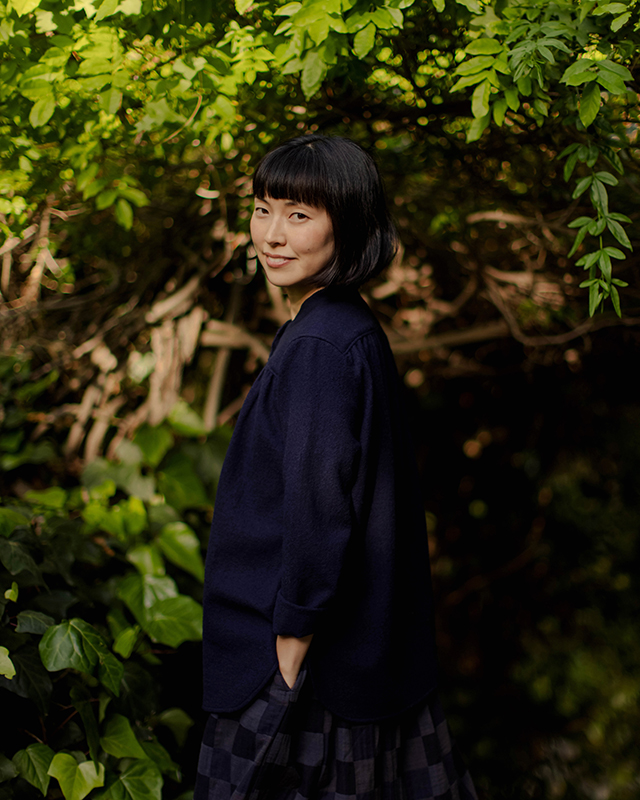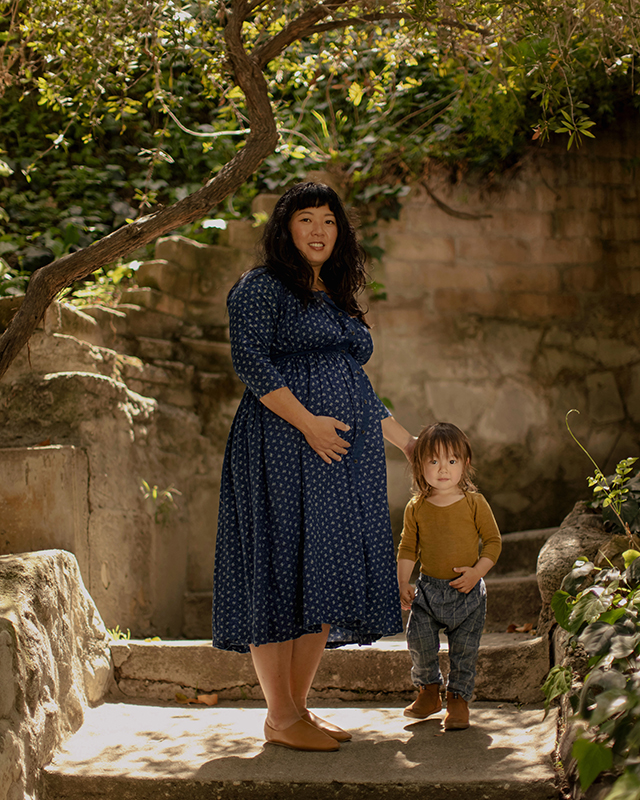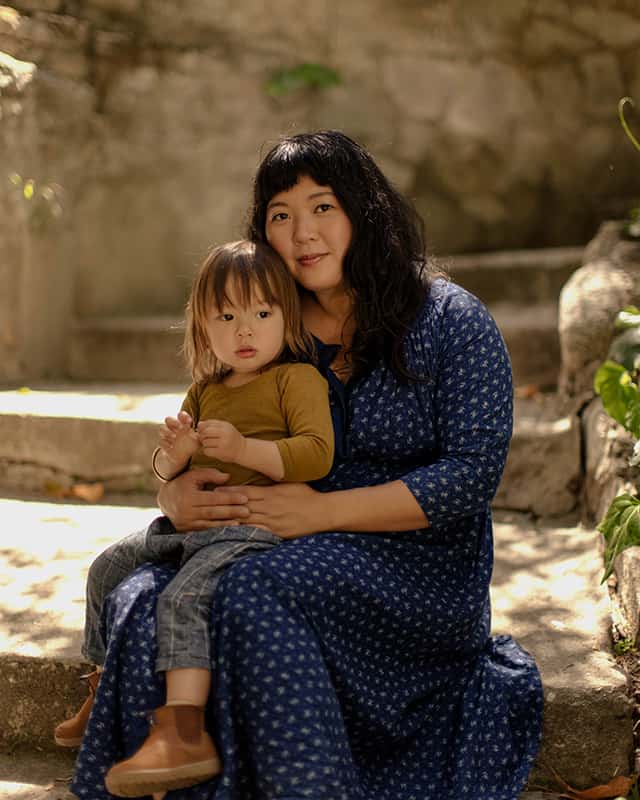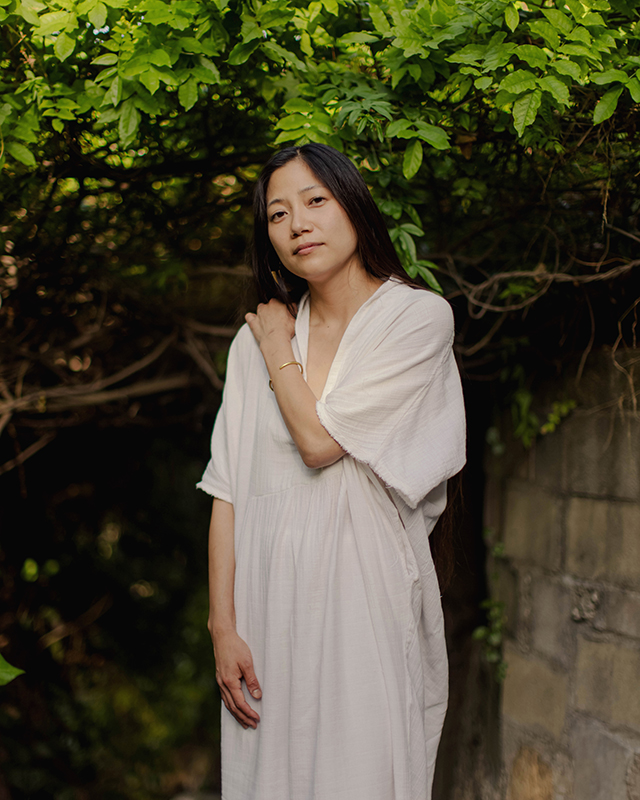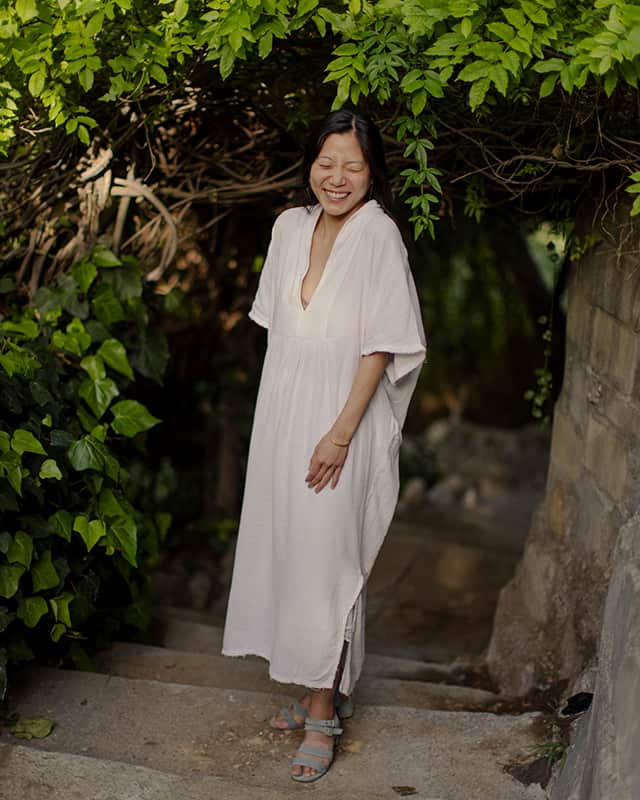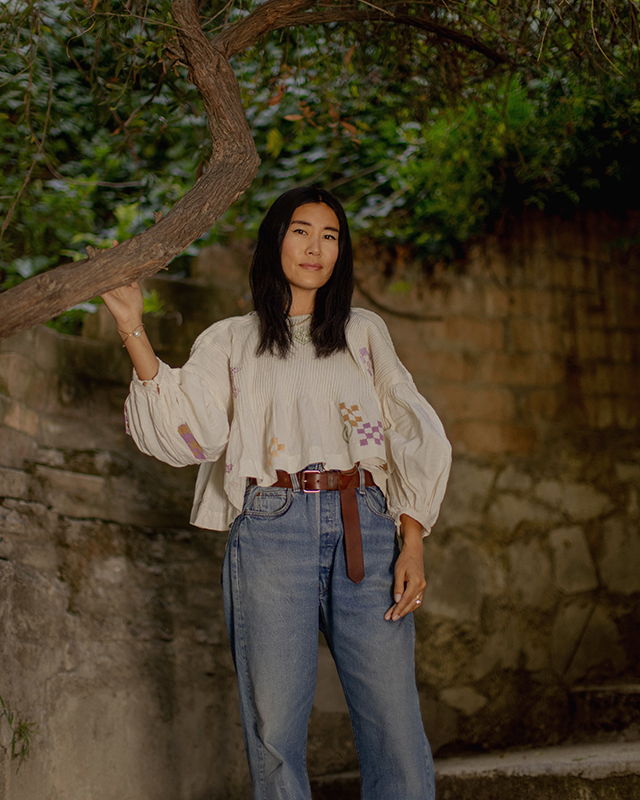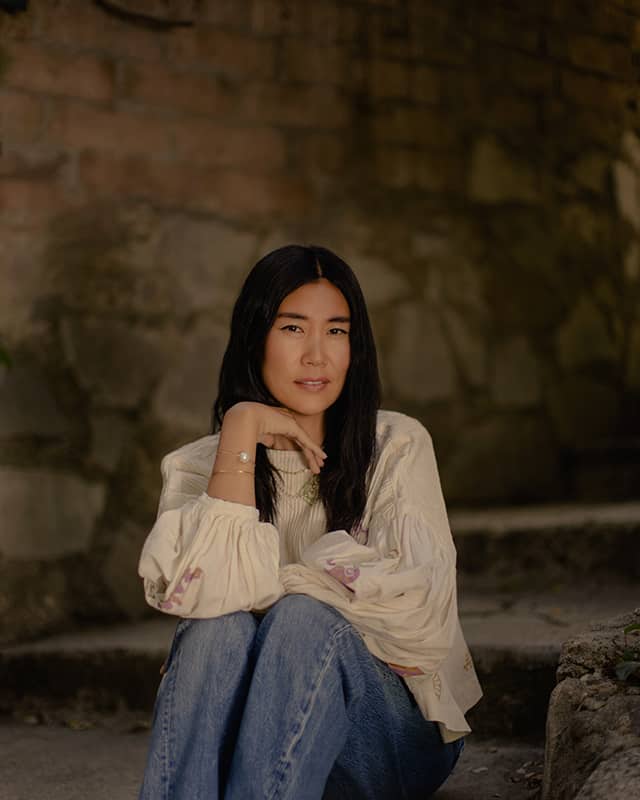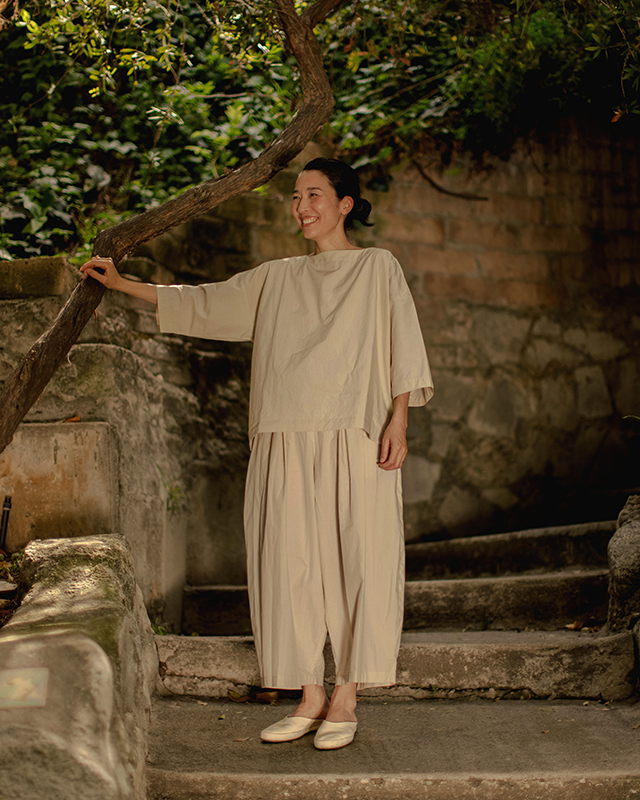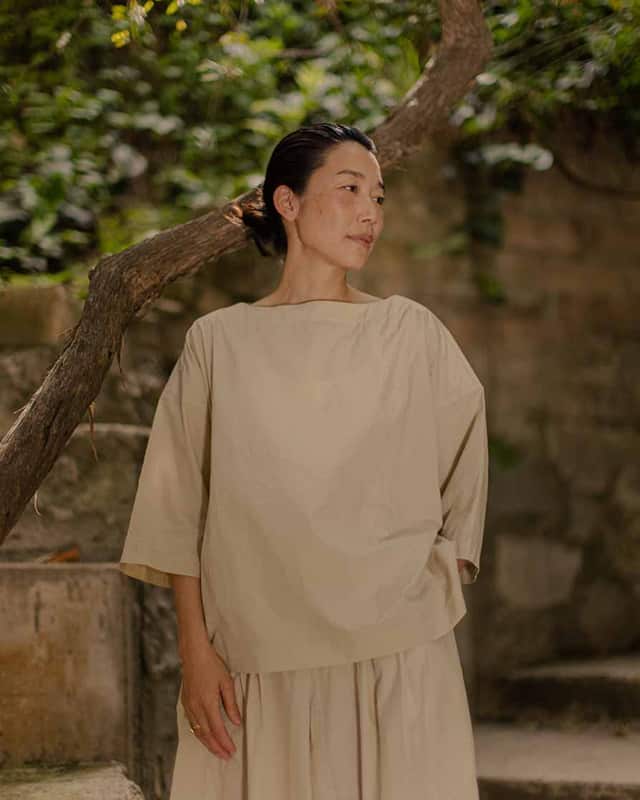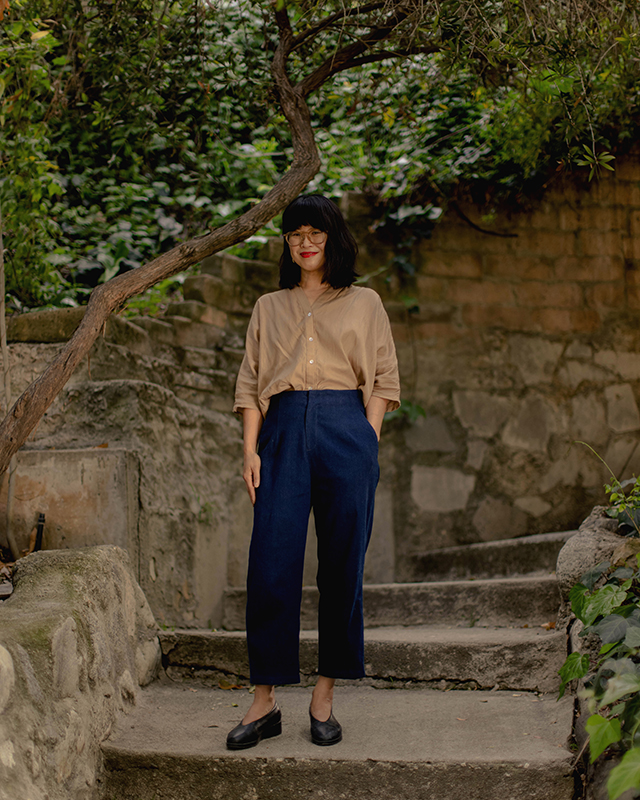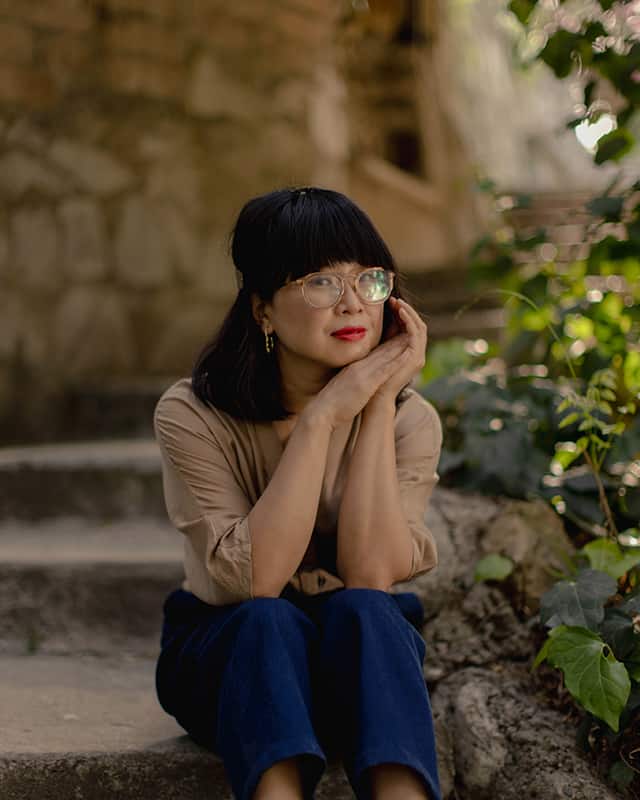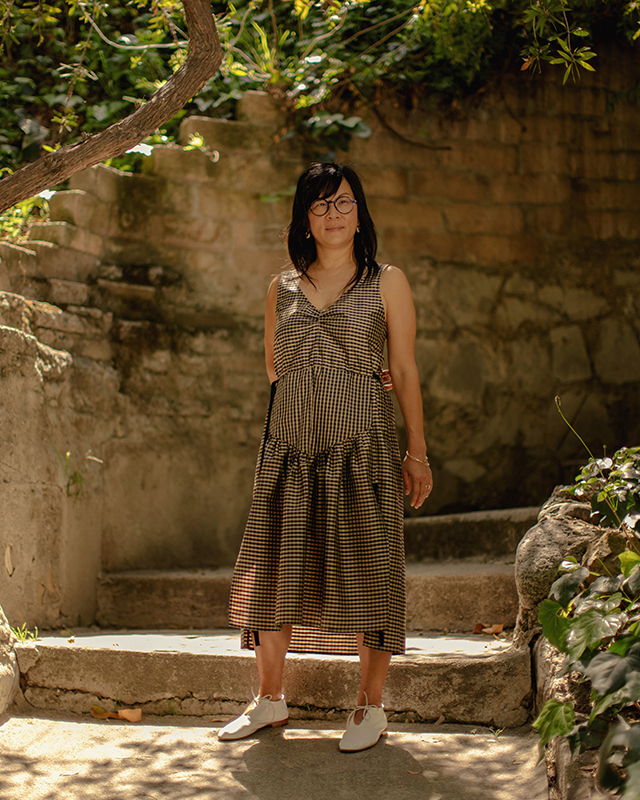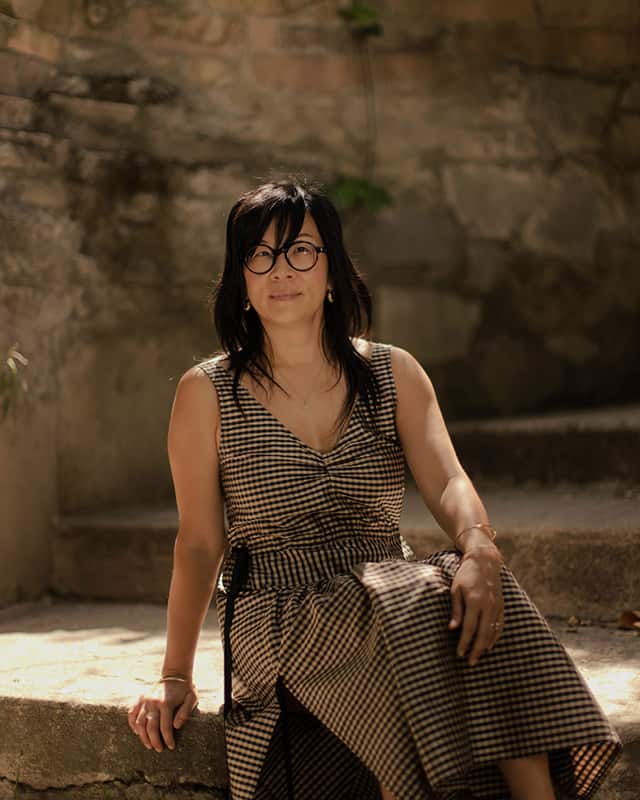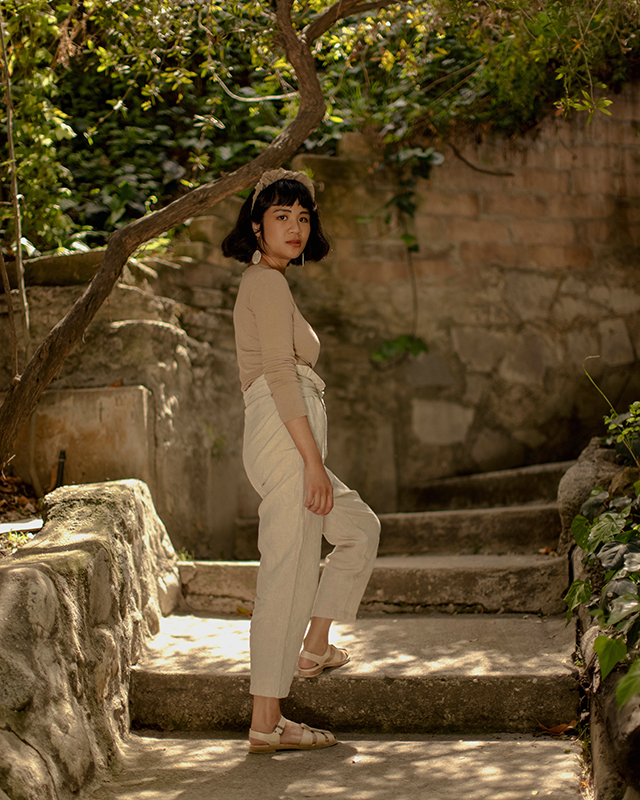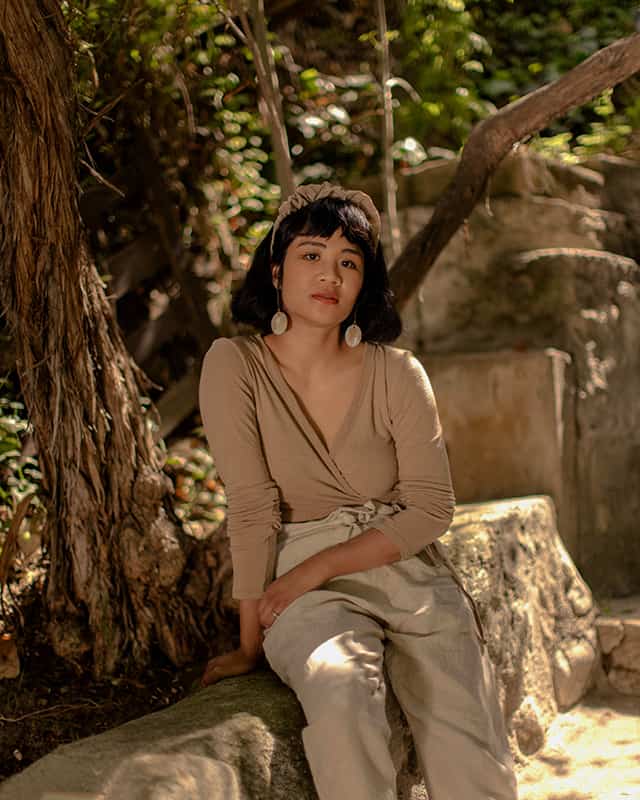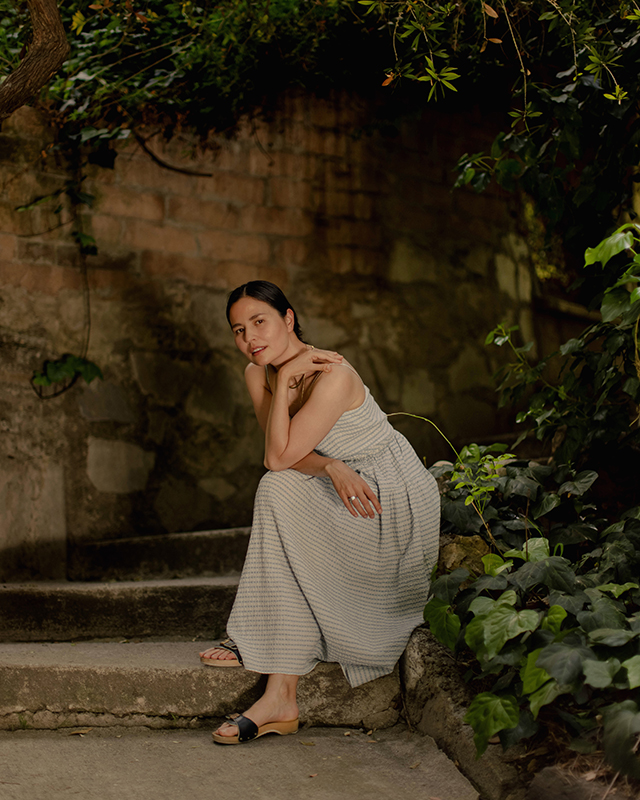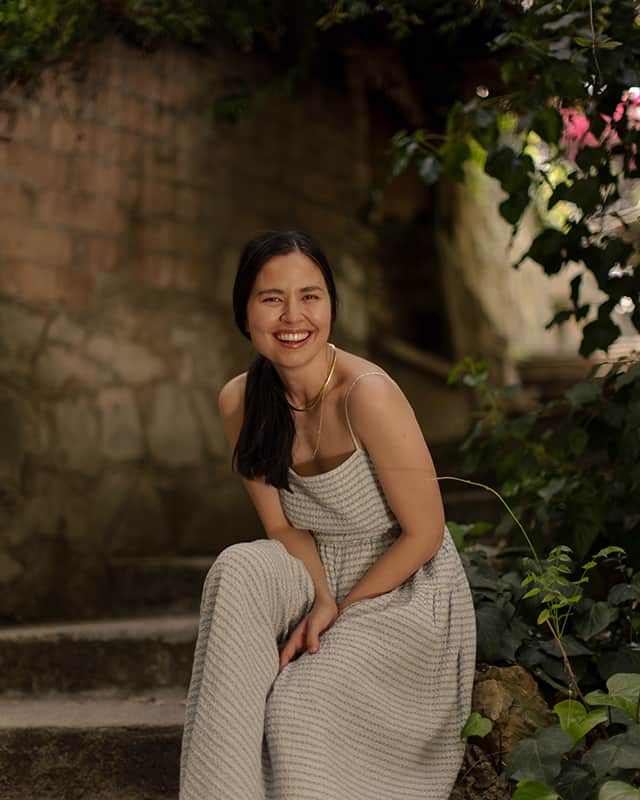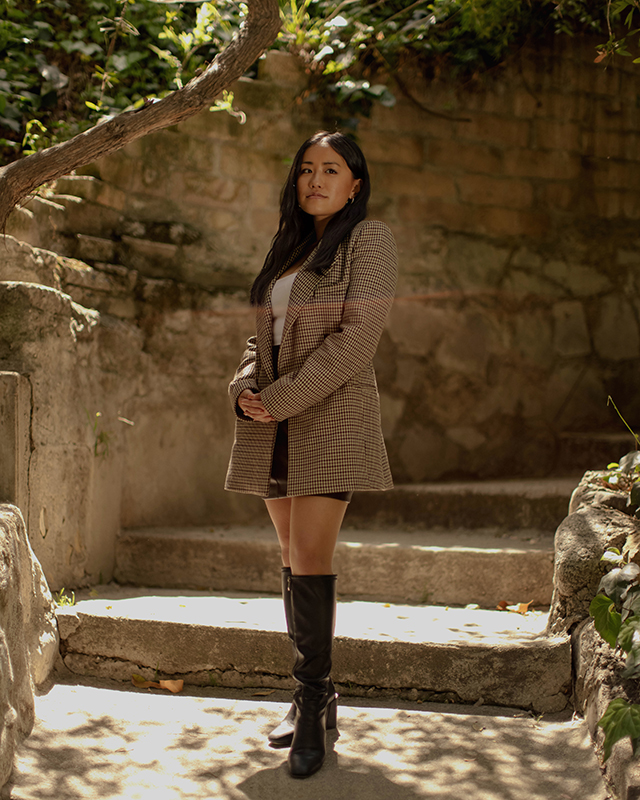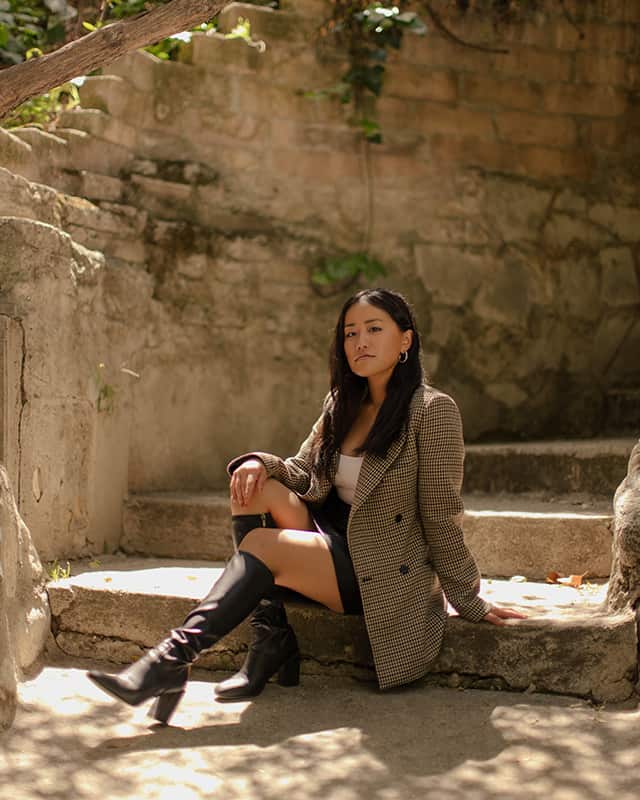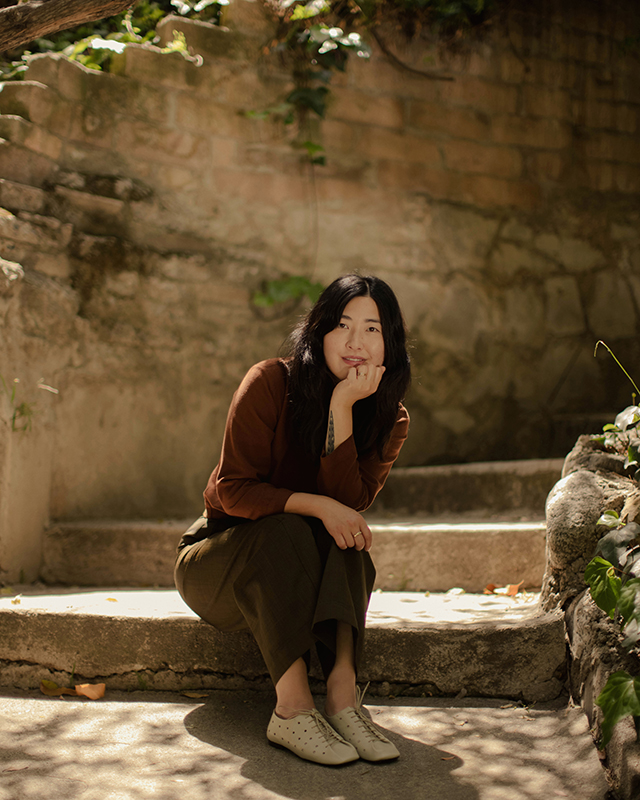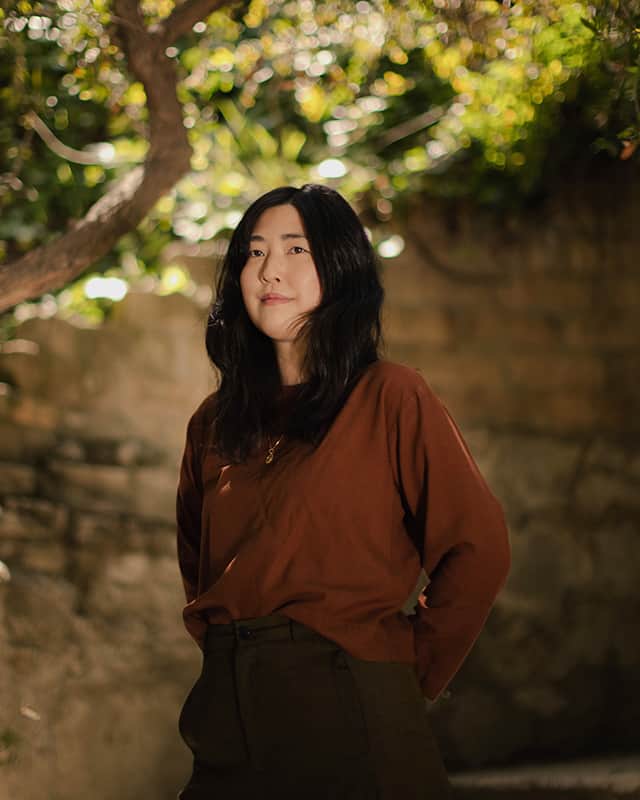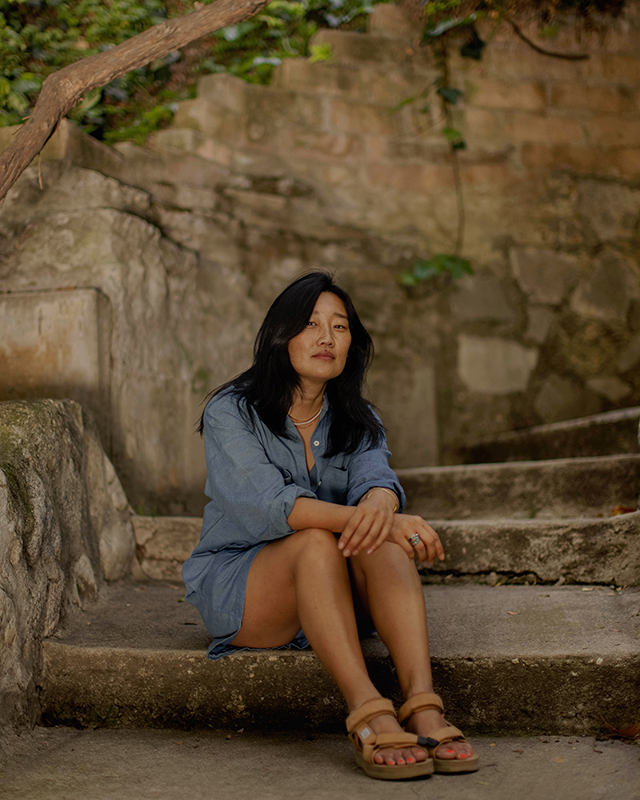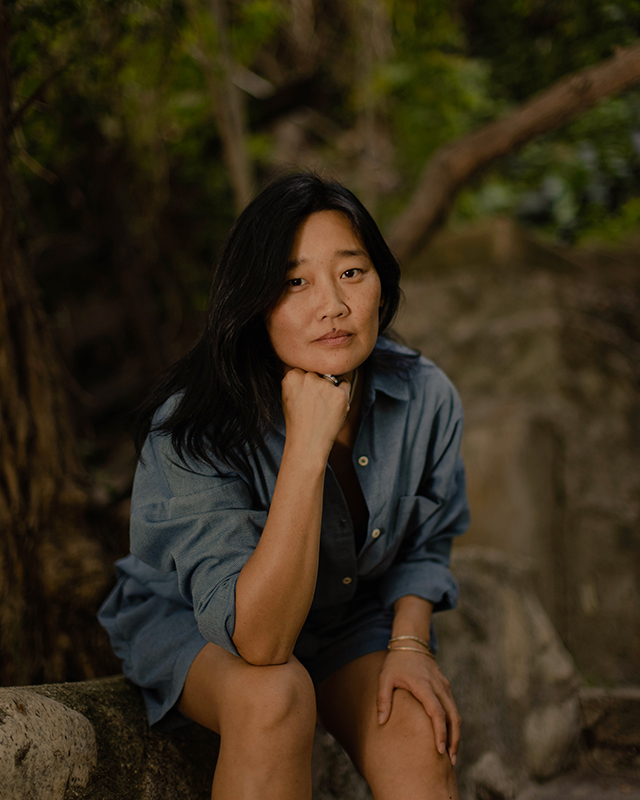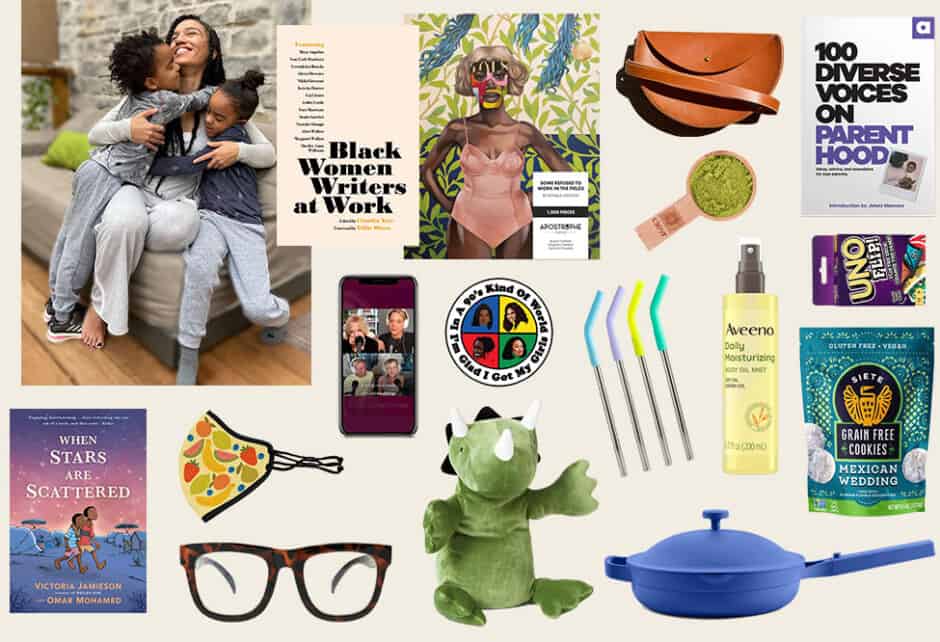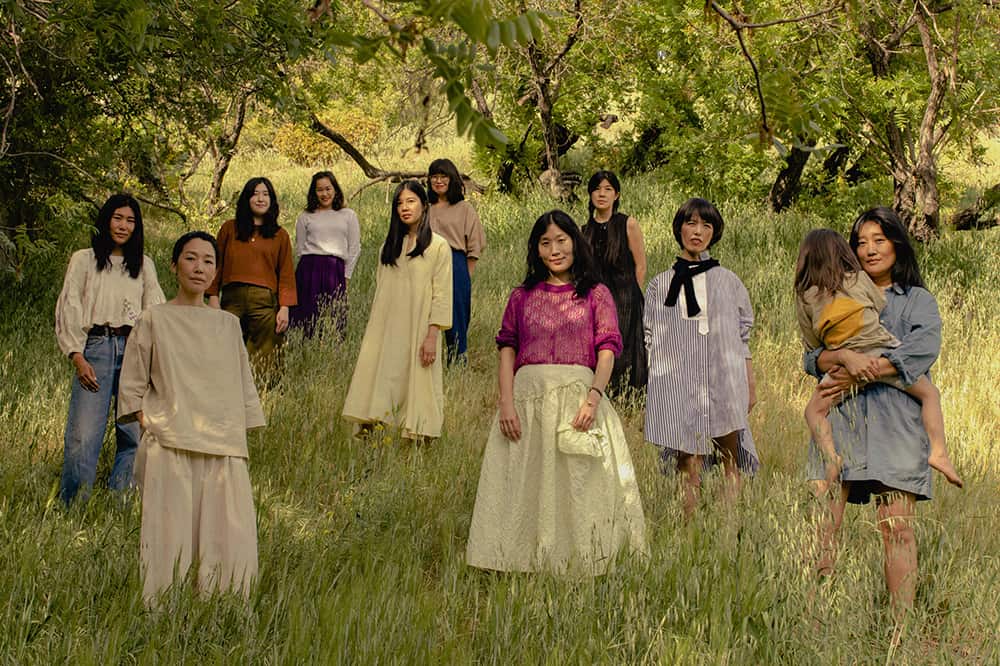
20 Inspiring Women On Growing Up Asian American
Written by Katie Hintz-Zambrano
Photography by Tracy Nguyễn
Today’s feature can be a hard one to read, but we think it’s important that you do so. After the barrage of hate crimes against people of Asian and Pacific Islander descent in 2020 and 2021, children’s boutique owner, mother, and second-generation Korean-American Caroline Kim decided to do something about it. In May of this year, she launched the AAPI-focused, social media-based fundraising initiative Joy Not Hate as a way to bring fellow L.A.-based creative entrepreneurs together to raise funds for Advancing Justice.
In addition to auctioning off an array of covetable goods by AAPI-owned brands, Caroline also sees Joy Not Hate as an opportunity to tell these entrepreneurs’ very personal accounts of growing up Asian American in the U.S.—including sharing heartbreaking stories of racial discrimination, as well as stories of resilience and hope.
Below, we are sharing 20 of these women’s interviews. Many of them are tales of perseverance as they bravely break the cycle of silence that was modeled by some of their parents, in order to blaze a new trail forward for folks of AAPI heritage in their own generation, as well as their children’s. Click through our slideshow to read their diverse perspectives and find out the many ways we can all unite to #stopasianhate for good.
To note: Joy Not Hate plans to launch its next auction and series of interviews with New York-based creatives in early August. Other U.S. cities are planned for the near future. The organization also strives to include more South Asian and Pacific Islander voices to their series, to showcase the full breadth of diversity in the AAPI community.
-
AAPI Background: “We are Taiwanese American. Our parents were immigrants to the U.S."
Tell us about your childhood and family.
“My parents, together with my dad’s family, came to the U.S. in the '80s and settled in Torrance, California upon arriving," says Kimberly (pictured top). "Like many immigrants new to a country, they followed in the footsteps of their peers. They took over a fish and chips shop in a strip mall and did this for about 2 years. My dad worked many odd jobs on top of the restaurant—in a body shop, sheet metal company, part-time engineer. At one point he figured out how to make a single component for the (then up and coming) personal computer companies that changed the game. He started his business in our family’s garage. My mom and grandparents were his assembly line in the beginning.”
Do you speak any Asian languages?
“We were born in the U.S., but Taiwanese was our first language and what we still speak at home," says Kimberly. "We can also speak Mandarin. We grew up in a place where there were very few Asians and minorities around. Taiwanese as a language can be hard to place, sometimes even for other Asians. Because of this I spent many years hiding it from friends—whispering on calls to my mom, that sort of thing. Now of course it’s a source of pride, to be able to speak a language that is largely only passed down from generation to generation.”
-
What kinds of discrimination (if any) did you or your family face?
“When I was a freshman, a high school friend was murdered because he was Asian," recalls Nancy (pictured left). "It was an awful crime that forced me to reckon with the harshest reality of racism—death. The support amongst my very small Asian American community at school felt deeply unifying, even if we were unified in pain and anger. At 16, scrawling ‘AZN PRYDE’ in white-out marker on a Jansport backpack felt like a form of armor, a necessary show of alliance, a literal means of screaming ‘we matter’ to our non-Asian peers. The murderer pleaded insanity and didn't serve any time and I mostly remember growing louder that year (my mom can attest to that). Until the recent killings in Atlanta, I didn't realize that I had gradually buried Kenny's murder inside my psyche—likely because I am still in disbelief or because acknowledging the proximity and possibility of that kind of hate is too terrifying. To this day, I still grip the hands of my AAPI friends a little closer and tighter than necessary.”
“I don’t know if I’d like to go into a specific instance really, as there were undoubtedly many, but would just like to say that it’s upsetting how certain encounters left me feeling embarrassed about my culture during formative years," says Kimberly. "What would have happened if my confidence wasn’t worn down by these collective experiences? In the last few years there seems to be more attention paid to Taiwanese culture in the West, and openness to learning. For the most part I wholeheartedly welcome it, though sometimes it can feel too little too late.”
-
What do you want the greater public to know about the AAPI community?
“I hope the next generation of AAPIs will feel less of a gap between who they are at home and in public," says Nancy. "Existing in a continuous state of limbo, between the pressures of having to be fluent in one heritage and then another, equates to a lot of unspoken compromise. And having to compromise this complexity and hide half of one's identity is the result of being a minority in a majority world. I'd love to see less alienated + apologetic and more resolved + celebrated AAPI babies in the future!”
You can follow Nancy and Kimberly at @nancykwu, @kc_uu, and @buildingblock on Instagram. You can shop their collection at building--block.com.
-
AAPI Background: “I am half Okinawan Japanese. My great grandparents immigrated to Hawaii separately and met and married there. My grandparents and my mom were also born and raised in Hawaii and they all became U.S. citizens when Hawaii was adopted as the 50th state in 1959. I think I am technically 4th generation (yonsei).”
Tell us about your childhood and family.
“My mom was a public junior high school music teacher and choir director and my dad owned a music instrument shop. They met and married in the Inland Empire area of Southern California, which is also where I grew up.”
Do you speak any Asian languages?
"Japanese was my mom's second language since she grew up speaking English in Hawaii and unfortunately since she worked full time, both those factors together made it hard for her to find the time to teach me. She did give me lessons in her free time when I was younger, but it didn't last long enough for much of the language to stick with me. I desperately wish I had grown up speaking Japanese in our household because I think it would further connect me to my roots and help me understand my culture and where I came from more. We did visit my mom's homeland of Hawaii quite often growing up which imparted specific AAPI culture in me that I wouldn't have experienced in Southern California.”
-
What kinds of discrimination (if any) did you or your family face?
”My dad's parents, who were Caucasian, made quite a few racist remarks to my mom over the years. Although I can't remember any specific instances where they treated my sister and I with discrimination, I always wondered if they thought of us as less than their other grandchildren because of our mixed ethnicities. They also cut my sister and I out of their will, which they claimed was for other reasons, but that was an instance that made me speculate as to what their opinions of us actually were.”
What do you want the greater public to know about the AAPI community?
“Representation really does matter! I don't really remember there ever being a character on television or in movies I related to much at all before Lane Kim on Gilmore Girls. She played a Korean girl, but was actually a Japanese actor who was born in Hawaii. I happen to look a lot like my Caucasian dad so I look nothing like her, but because her character on the show was raised quite similarly to me, although in a more extreme way, I felt so connected to her and her obviously contradictory feelings about being brought up in a very different environment than her peers. I felt seen and understood by the mainstream media (in part because the Korean producer on the show helped to form a lot of her character from personal experience) and that's such an important feeling for kids of all races.”
You can follow along with Keiko at @smalladventure on Instagram. You can shop her artwork at smalladventureshop.com.
-
AAPI Background: “I am a 2nd generation Korean-American. My parents immigrated from South Korea to Los Angeles.”
Tell us about your childhood and family.
“My parents had a very textbook immigrant experience—something that didn’t become clear to me until I literally read it in a textbook. But they did it all: ran a dry cleaners in Highland Park, owned a liquor store in Oxnard, and then got into the garment district in Downtown L.A. We lived in Camarillo during my elementary-age years and then moved to La Crescenta.”
What kinds of discrimination (if any) did you or your family face?
“We were never victim to any of this emboldened hate that we’re seeing in the news lately. I feel weird saying that we’re lucky in that sense? Because there’s always been an underlying, steady discrimination that’s always been present. At the time, growing up in Camarillo, I was the only Korean (let alone Asian) person in my school. That tokenness came with comments on how my eyes were weird, persistent questioning on what I ‘was,’ knowing deep down that the boy I had a crush on would never like me because I wasn’t ‘pretty’ like the other girls, the usual list goes on. I think this all contributed to me othering myself in relation to everyone.”
-
How were you taught to deal with discrimination or racism?
“I think there’s a bit of a toughness that’s just inherent in my culture and upbringing. I’ve never really had explicit teachings in how to deal with discrimination or racism. In some ways, I’m only now coming to a place where it’s not even about how to deal with racism but how to identify it. Hindsight brings to surface all these instances that I know now aren’t right.”
What do you want the greater public to know about the AAPI community?
“I would like them to know that we are American. Our experiences are American. We should not be told to go back where we came from or that we don’t belong here. Because neither of those statements are true. I think that’s something that needs to be relearned not only by the people who are making those kinds of comments, but by people like my parents as well. Whenever my parents use the word ‘American,’ they mean white. And I feel so dissatisfied by that. We don’t need to completely remove ourselves from this country’s identity so that we can’t even use the moniker ‘American’ when referring to each other. But we also don’t need to morph ourselves to be more in the likeness of white (like my younger self once believed) to prove that we belong. Our experiences matter and they greatly contribute to the fabric of this country.”
You can follow Joyce at @joycejchai on Instagram.
-
AAPI Background: “I guess technically I am 2nd generation Taiwanese. My family moved here for a few years, but I moved back to Taiwan at a young age and went to international school all the way until the end of high school. I then moved to California for college and have been here ever since.”
Tell us about your childhood and family.
“My dad is a businessman, and my mom stayed home to take care of us 3 kids. My dad traveled back and forth between L.A. and Taiwan when I was really young. Eventually, our entire family moved back to Taiwan to be closer to our grandparents. My parents also wanted me and my siblings to learn proper Mandarin. Today I speak Taiwanese and Mandarin to my parents and relatives.”
What kinds of discrimination (if any) did you or your family face?
“I lived in Burbank, where there were very few Asian families. I remember hating to go to school because I was just beginning to learn English and I didn't know how to make any friends. I cried every morning when I got to school because I thought the kids were staring at me for being different. I just felt so out of place and uncomfortable.”
-
How were you taught to deal with discrimination or racism?
“I think my experience is quite different from most. Having grown up in Taiwan and going to an international school, I was always aware that I was Taiwanese American. Not quite fully Taiwanese or American. My school was where I felt comfortable because my friends all had a similar upbringing. It was not until I moved to California that I felt really out of place. I didn't know any slang and cultural references, and I remember nodding my head or laughing at jokes even if I didn't truly understand. Just because I wanted to fit in and I didn't want people to judge me.”
What do you want the greater public to know about the AAPI community?
“I feel very fortunate to be able to do what I do, I have great family and friends who have always been so supportive. I actually had the idea to start The Wax Apple because of my grandma. She would always show me around Taiwan and together we found a majority of what is available in our shop. I wanted to show people all the amazing things and culture from Taiwan. With the recent surge of anti-Asian hate, especially to elderly Asian women, this really hit home. What if someone harmed my grandma? Why would someone harm anyone's grandma? To be decent human beings, we should be kind and respectful to people.”
You can follow along with Juliana at @jujumade and @the_wax_apple on Instagram. You can shop her collections at jujumade.com and thewaxappleshop.com.
-
AAPI Background: “I’m 2nd generation Korean American.”
Tell us about your childhood and family.
“My parents moved to the U.S. during the late ‘70s as my father was a banker and transferred to the U.S. My mother was and is a homemaker and took care of 4 children in a new country. We later moved to Orange County because my father decided to start his own business to become a sock entrepreneur.”
What kinds of discrimination (if any) did you or your family face?
“I can't speak for my family because, strangely, we never discussed such things in the home. I grew up in a very white suburban neighborhood in Orange County. That childhood/teenager experience conjures up many complicated hurtful memories and the emotion that continues to pop up is the feeling of being insignificant. This is a bigger discussion to be had!"
"As far as a discrimination, I believe my first encounter was in kindergarten. I didn't speak English at the time because we had moved from Korea, but this teacher was so mean to me in ways I couldn't understand. To make matters worse, I wanted so desperately to please her and would bring little gifts to win her over. All I remember are her condescending tones and disdainful looks. The situation that still makes my blood boil to this day was when she had me pick up another kid's trash. Even though I didn't understand racism then, it was made clear to me and the others that because I was different and didn't speak English, I could be talked down to and treated differently. She made it ok to treat others less than and oh, my blood is boiling again!”
-
How were you taught to deal with discrimination or racism?
“Unfortunately, I spent a lot of my childhood and teenage years trying to assimilate to being as white as possible. Ugh, I hate that about my childhood and hate putting it out there. I suffered from my own internal racism by ignoring my incredible cultural heritage! Now, I am so proud to be Korean American—our Korean history and family story is so beautiful, so resilient, and multi-facetted. I can't believe I spent years pushing it under a rug. Luckily, I came to my senses at 17 when I met an incredible group of Asian American friends with similar experiences in college. I remember those early years in college feeling so connected, relevant, and empowered. In terms of overcoming or actively fighting, I think it starts with yourself. It took me a long time to acknowledge these feelings and I am still processing them. Having a community to share such experiences and feeling heard is helpful in overcoming feelings of discrimination. I am also all about teaching myself to be bold and unafraid to call people out. I am naturally a slow responder and non-confrontational, so I’ve come up with a few one liners when facing microaggressions or discrimmination.”
What do you want the greater public to know about the AAPI community?
“I think we still have a long way to go in seeing more Asian American representation in politics, media, and American pop culture. For me, growing up the way I did, it would have meant so much to see an Asian American face I could relate to or be inspired by. On a different note, I am motivated as an AAPI woman and business owner to collaborate and create a strong community with others because there is strength in numbers. We need to work together to build our communities, give voice to those who can't, and grab racism by the balls because that type of evil has no place in this world anymore. It's time to push it out.”
You can follow along with Hannah at @hanselfrombasel on Instagram. You can shop her collection at hanselfrombasel.com.
-
AAPI Background: “1st generation Korean-American.”
Tell us about your childhood and family.
“I grew up in a suburban town in greater L.A. county. My dad owned an import business.”
What kinds of discrimination (if any) did you or your family face?
“It's hard to list them all here, but subtle and sometimes aggressive discriminations, name-calling, and making fun of accents, and childish rudeness.”
-
How were you taught to deal with discrimination or racism?
“My dad always said that I must try harder and better to fight discrimination and I did do that for the most part. When I saw another Asian kid being made fun of, I would always try to stand up. The 92 L.A. riots happened during my junior year in high school and even though we lived about 40 minutes away, the tension was there. During one class, we had a conversation and things got really intense, especially this one kid throwing insults at the few Asian kids. I remember arguing with him and trying to defend myself and the other Asian kids and walking out of the class. My teacher didn't want to get involved because he wanted an ‘open dialogue.’ Whenever I or someone I saw being made fun of because of their accents or being called names, I would always stand up and not ignore the situations.”
What do you want the greater public to know about the AAPI community?
“That we belong here just as much as anyone else.”
You can follow Angie at @angiepoketo and @poketo on Instagram. You can shop her collection at poketo.com.
-
AAPI Background: “I am technically 3rd generation but could also be considered 4th generation Japanese.”
Tell us about your childhood and family.
“My parents were born in internment camps and grew up in L.A. My mom is an interior designer and my dad was a high school English teacher. I grew up in Silverlake, Los Angeles. In middle school, I found out that I was the only person in my class who spoke English at home and did not know how to speak any other languages.”
What kinds of discrimination (if any) did you or your family face?
“I was very lucky to not be aware of any discrimination growing up, other than the typical microaggressions that define the Asian American experience. I grew up in a pretty diverse, majority POC environment where I didn't often feel the need to question my Asian-ness.”
-
What do you want the greater public to know about the AAPI community?
“The main message I want to share is that our community needs empathy and action right now. Silent allyship will not help us, we need vocal support. Recently I shared my story of being the target of a racist verbal attack in my neighborhood. This area is assumed to be safe by most residents, but it's actually not even the first occurrence. I shared it on my business Instagram so that the story would be public and reach more people. Even my close friends were shocked and didn't realize it could happen here. But in reality, it happens to me (in various locations) several times a year. But the most disappointing thing about the entire incident was even though the Stories were viewed by hundreds of people, I didn't receive any reaction whatsoever from non-POC viewers who didn't know me personally. To quote Cathy Park Hong, ‘where does the silence that neglects her end, and where does the silence that respects her begin? The problem with silence is that it can't speak up and say why it's silent. And so silence collects, becomes amplified, takes on a life outside our intentions, in that silence can get misread as indifference, or avoidance, or even shame, and eventually this silence passes over into forgetting.’”
“There is a stereotype that Asian Americans/AAPI are assimilated or want to assimilate into corporate American culture, but it's just not true for everyone. Additionally, I have experienced racism that transcends microaggressions in a work environment, some incidents that resulted in getting turned down for a raise or promotion. AAPIs are not a monolith, but I'd be willing to bet that this is a common experience.”
You can follow Misa at @botanicaworkshop on Instagram. You can shop her collection at botanicaworkshop.com.
-
AAPI Background: “I was born in Japan, but have lived abroad for most of my life. I am first generation, the rest of my family still reside in Japan.”
Tell us about your childhood and family.
“I grew up living in many different countries because of my father’s work. He was a diplomat for the Japanese government. Our family moved with him whenever he was posted to a new country, which was every 2-3 years. First, I learned French as a toddler living in Belgium, then Japanese when we briefly moved back to Tokyo. When I was 8, we moved to Trinidad and I learned English so I could attend a local elementary school. After that we moved to Kuala Lumpur in Malaysia, then on to Boston. I moved to Los Angeles eventually for college, and have stayed here ever since! My family kept moving to Singapore, Jamaica, Philippines, and Australia before retiring in Japan.”
What kinds of discrimination (if any) did you or your family face?
“Unfortunately, discrimination is universal. Racial prejudices that many immigrant families face in the U.S., our family experienced also living in many different parts of the world. In Trinidad, I remember kids in school asking about my onigiri (rice ball with seaweed) lunches, and the gross look on their faces. I went home and told my mom I wanted sandwiches for lunch from that day on. My parents were often called ‘Mr & Mrs Chin' by random strangers in public, and the occasional ‘chingchong’ sounds and slanting of the eyes were made towards us for looking different. After moving to Malaysia, those kinds of racial discrimination lessened, but we were exposed to another type of prejudice between non-religious people and the country’s predominantly Muslim people.”
-
How were you taught to deal with discrimination or racism?
“Maybe this is generational, but at that time, my family didn’t openly discuss discrimination or racism—I hope to change this with my own family, especially since my daughter is mixed race. Living in L.A., we are surrounded by so many different people with diverse backgrounds, and we hope to expose her to it all—the good and the bad—so we can all grow to be aware, ask questions, and stay open-minded.”
What do you want the greater public to know about the AAPI community?
“I would like to mention a few things: First, it has been interesting to compare America with a mono-culture like Japan, where everyone has similar features like dark hair and dark brown eyes, speaks the same language and in many aspects Japanese people are trying to break free from this mold. America’s diversity should be celebrated, not picked apart and targeted for discrimination. Secondly, AAPI people are often characterized by our quiet and agreeable nature, but we—the AAPI community—can no longer internalize our hurt feelings. We must speak up and stand our ground. And lastly, it has also been distressing to see no actions taken by the people around hate-crime victims. Be an ally, don’t just stand there. No matter who you are, if you see an injustice, do something, say something.”
You can follow Airi at @wrk_shop on Instagram. You can see more of her work at wrk-shop.com.
-
AAPI Background: “My parents immigrated here in the ‘70s from Taiwan, which makes me a 2nd generation Taiwanese American.”
Tell us about your childhood and family.
“My parents are farmers who grow Chinese fruits and vegetables in Southern California. They’ve had farms in San Juan Capistrano, San Diego, and Oceanside but, as with most humble beginnings, their first farm was in a small backyard in Torrance. I was raised in South Orange County. I was lucky enough to learn how to speak Taiwanese at home growing up and went to Chinese school to learn Mandarin on the weekends.”
What kinds of discrimination (if any) did you or your family face?
“Being the youngest of three children, my parents sought to protect me as much as possible. Having been sheltered from any discrimination or difficulties they may have faced, I was shocked by their growing fears last February due to the anti-Asian violence brewing. My parents were so afraid that my mom no longer felt safe taking the train to come visit me.”
-
How were you taught to deal with discrimination or racism?
“It's horrible, but I do feel like I was taught to not make a fuss and stay out of trouble. But the more racism I faced as I got older, the more I wanted to keep my head up and defend myself by speaking out. Although, on occasions when these situations occurred somewhere in public, I learned that having a screaming match on the sidewalk with an irrational racist has not solved anything. I don't think you can just overcome racism. Each time you experience racism, you have to re-evaluate and figure out how to stand up for yourself in the right way. This year has created a new element of fear around me or my elders getting physically hurt that I never imagined I would have. This will be an ongoing battle.”
What do you want the greater public to know about the AAPI community?
“AAPIs of all cultures are everywhere. We own businesses you shop from; we are designers and artists who create things; we are doctors, nurses, and caretakers, restaurant owners, chefs, servers, engineers, accountants, bankers. We may only comprise 6.5% of this country, but we are not invisible and we deserve to be seen.”
You can follow Linda at @lindahsaio on Instagram. You can shop her collection at knotworkla.com.
-
AAPI Background: “I am 2nd generation Korean-American.”
Tell us about your childhood and family.
“My mother is a dentist in Orange County. As a kid it seemed to me like she was the only Korean mom who worked full time, was divorced, and didn't have a religious community around her. She was a real rebel to me.”
Do you speak any Asian languages?
“Yes we speak Konglish! Both my parents speak fluent English but we always loved communicating in both languages and often hybridizing words.”
What kinds of discrimination (if any) did you or your family face?
“In 2001, during the summer heading into our senior year of high school, my dear friend Kenny Chiu was murdered in front of his own house by his neighbor, who later claimed to be proud that he acted ‘like...a klansman.’ To be clear, this was in a middle-upper class Orange County suburb where we had a substantial AAPI community and erroneously felt assimilated. This wasn’t some urban melting pot of racial tension. Violence can be quiet, even when it happens in front of us."
"I’m bringing Kenny’s memory into this moment because I’m angry at myself for not having been louder, or angrier, and certainly for not having done more. At 17, I truly believed Kenny’s murder was so unforseen, so tragic that it had to be anomalous."
"The shootings in Atlanta and the rise in violence against the AAPI community in the last months has proven that none of this is anomalous, we’re just acknowledging what has been silently growing under the guise of half-hearted acceptance. I’m no longer interested in acceptance. I’m interested in reframing the story.”
-
How were you taught to deal with discrimination or racism?
“I was taught to deal with racism but othering myself. I learned to internalize a white gaze from an early age, perform my Asian identity in a way that was non-threatening and exotifying. As an adult I understand the disturbing implications of forming a cultural identity through the reflection of a larger majority. I'm constantly asking myself what authenticity really means.”
What do you want the greater public to know about the AAPI community?
“I worry that the Asian American identity isn't allowed to evolve organically. As a 2nd generation Korean-American, what is authentic in my experience doesn't hold true for my mother and won't hold true for any future children I may have. Like any cultural identity, the definition of authenticity changes with every generation. For example, I grew up eating not only Korean food, but Vietnamese food and Taiwanese food and Mexican food. However, the most common question I get regarding my cooking is, ‘Do you cook Korean food?’ While the answer is obviously yes, I find the question lazy and assuming. I'm not saying I have access to all these other cuisines. I'm saying that we are doing ourselves a disservice by defining our Asian identities by an old world rubric.”
You can follow Saehee at @soo_nfood and @saeheecho on Instagram.
-
AAPI Background: “I am 1st generation Korean American. I was born in Korea, spent elementary school in the U.S., and moved back here 13 years ago.”
Tell us about your childhood and family.
“My parents had a restaurant when we lived in Dallas. The American dream wasn’t as great as they thought, so they moved back to Korea a few years later.”
What kinds of discrimination (if any) did you or your family face?
”I am sure my parents dealt with a lot, but they never really talked about it. For me and my brother here, we got made fun of and bullied constantly at school. It made me hate my Korean heritage and I felt uncomfortable in my own skin. It’s awful to deal with this identity crisis growing up.”
-
How were you taught to deal with discrimination or racism?
“We were told to not make a fuss and keep your head low. The important thing was fitting in. Which is ironic because we would never fit in if we never stood up for ourselves. I overcame the internal turmoil when we moved back to Korea. I was finally comfortable in my skin. I didn’t have to try to fit in anymore. That helped my self-esteem around my heritage and helped me be confident when I did end up traveling, studying, and living abroad as an adult.”
What do you want the greater public to know about the AAPI community?
“Every human needs to be treated with dignity no matter where you are from or what you look like. We belong here. And I hope my son and his generation will have an easier time embracing his identity and speaking up.”
You can follow Bo at @bo_yeong, @mohawkgeneralstore, and @smock.co on Instagram. You can shop her store mohawkgeneralstore.com.
You can also read her MOTHER profile here.
-
AAPI Background: “I was born and raised in Japan and moved to Los Angeles at age 14.”
Tell us about your childhood and family.
“My father got assigned to the Los Angeles office from Tokyo in the ‘90s and lived here for five years. I grew up in Tokyo and decided to come along with my father to live in Los Angeles.”
Do you speak any Asian languages?
“My whole family lives in Japan, and my husband is Japanese, so my primary language at home is Japanese.”
What kinds of discrimination (if any) did you or your family face?
“Over ten years ago, when I was taking a walk in Central Park, a group of teenagers threw a number of big rocks at me with some racial slurs. Luckily only one of the rocks hit my body, but not my head, so I did not get injured. However, the traumatic impact of this discrimination never fades. I was shocked by witnessing anti-Asian xenophobia in youth and wondering how those teenagers' parents raise such ruthless humans that think it's ok to dehumanize others based on race.”
-
How were you taught to deal with discrimination or racism?
“My parents did not talk about racism towards Asian communities with me that much. I became active in fighting racism because of discrimination that I experienced. I know that racism is not based on a singular act, and we all know that it will not magically disappear. But this past year, people have been more empowered to normalize anti-Asian xenophobia, stoking public hysteria and racist attacks. Racism against Asian communities is deeply entrenched in American history, but too often has been overlooked and rendered invisible and anti-Asian rhetoric is normalized. Now we should leverage social media’s power by exposing all the issues to raise awareness. If we stay silent when discriminated against, harassed, or harmed, we will once again remain INVISIBLE in this country. I will not stand silent until everyone in this country is considered equal.”
What do you want the greater public to know about the AAPI community?
“I humbly ask all of us to put ourselves in others’ shoes, regardless of who we are, our origins, or where we came from. By doing that, we may come to a much deeper understanding of what it means to care for one another. We all need to remind ourselves that we are all humans first.”
You can follow Momo at @black_crane and @momobc on Instagram. You can shop her collection at blackcrane.net.
-
AAPI Background: "Chinese-American."
Tell us about your childhood and family.
“I grew up with my parents manning an Italian pizzeria seven days a week in Torrance, California. It’s a pretty typical immigrant story, where as foreigners they knew they couldn’t get hired in a job like a regular English speaker, so the most logical thing to do is start your own business. I spent most of my days at Numero Uno playing arcade games like Tetris and Karate Champ at the hostess station, bugging the waitresses, and eating Spumoni ice cream out of the walk-in cooler. Restaurants can be good, lucrative businesses but incredibly backbreaking work, especially dealing with customers who can be mean and racist. A lot of customers were nice, but I definitely remember people speaking to my mom as if she were a child when they couldn’t understand what she was saying. My parents are college-educated from Taiwan and could understand everyone but just had to put up with this microaggression bullshit. They taught me I had to be able to speak Chinese perfectly in case the greater white, English-speaking society wouldn’t accept or hire me and that I could always have a job amongst other Chinese.”
Do you speak any Asian languages?
“I speak Mandarin and can understand Taiwanese. I am fortunate I spent my summers in Taiwan and grew up in a large Asian American community in the South Bay area of L.A., where a huge chunk of my high school in Palos Verdes was Chinese, Korean, and South Asian. My high school was almost 40% Asian American, and growing up there I felt the confidence to speak my mind about racism and Asian culture because being a person of color was the norm.”
-
What do you want the greater public to know about the AAPI community?
“In college I spent most of my energy focused on Asian American Studies and sociology. I actually wanted to be an Asian American Studies professor! I have always felt passionately about the representation of Asian Americans in academia, media, and greater society. I worked at the Asian Pacific American Program at the Smithsonian and did some Asian community outreach with the Department of Justice. I published a few feminist Asian American-ish zines in college and did a zine about gaming culture and technology in the early 2000s."
"I have always tried to make my voice known in whatever DIY punk way that was accessible to me and am glad to see that more Asian Americans are now doing the same. Talking about race, gender, and representation has just been so ingrained in my thinking since college that it’s truly part of my everyday."
"I have been a writer most of my career and now I work in visual arts, in ceramics and ceramic sculpture. I often look to ceramic traditions in Asia, namely China because that's truly where all most of the great ceramic traditions come from and I grew up with these forms and this aesthetic in my Chinese household. I am also glad to look to non-Eurocentric traditions in art because well, it's just more exciting.”
You can follow Raina at @rainajlee on Instagram. You can shop her collection at rainajlee.com.
-
AAPI Background: “2nd generation Korean-American.”
Tell us about your childhood and family.
“I was born in L.A. and then moved to Houston when I was 8. Like many immigrants, my mom worked in a sweatshop and my dad did the overnight shift processing checks at a bank. Eventually they bought and owned a hamburger joint in downtown L.A. until we moved to Texas where they went into the dry cleaning business. However, the Houston heat combined with the heat from the dry cleaning equipment compelled them to pivot back into the restaurant business. They took over a deli in an office building where they were open for breakfast and lunch and closed on the weekends, which was attractive to them so they would be home for dinner and be available to me and my brother. Unfortunately, after running the restaurant for 15 years, they lost it overnight from a hurricane that flooded it.”
What kinds of discrimination (if any) did you or your family face?
“Fortunately I was not a victim of racist acts or violence, but of course I have heard and experienced all the tired racist stereotypes over the years.”
-
How were you taught to deal with discrimination or racism?
“Very simply, I wasn't taught how to deal with racism. It was a hard, painful subject to talk about with my parents, who had their own struggles; I just believe they didn't want their kids to experience the ugliness of the world, so they didn't draw attention to it. It was just an understood thing that you didn't talk about, but inherently knew existed. Instinctively, I treaded lightly and moved on from racist remarks or uncomfortable situations. I was a ‘model minority,’ and then last year I decided enough is enough. I am more aware and have learned so much about racism and anti-racism movements, which has made me more confident and stronger in where I stand, as an Asian American woman.”
What do you want the greater public to know about the AAPI community?
“Amidst all the violence and regressive racial trends in our country, I try to remind myself of the progress we have made. I'm going to speak specifically to the culinary world since that is my interest. Kimchi and gochuchang are consumed more widely than when I was growing up. Chefs and restaurants are invoking Korean favors in their menus and people are becoming more and more aware of our wonderful cuisine. This is progress—we don't have to be embarrassed by the smell or exoticness of kimchi or any Asian foods that were once considered ‘weird.’ I hope by continuing to share our culture, flavors, and experiences, our differences will be minimized and ultimately celebrated.”
You can follow Jenny at @jennyhlee and @la_qt_appetit on Instagram.
-
AAPI Background: “I'm Filipino-American, second generation.”
Tell us about your childhood and family.
“My parents and grandparents moved here in the late ‘70s. My parents immediately started a family in their twenties—my mom was a full-time stay-at-home mother and my dad was a computer programmer/engineer until he retired very recently. My mom was always there for us, and my dad made sure we had everything we could ever need. My brother is now a computer programmer, my older sister is a nurse, I'm a writer/creative, and my younger sister is in marketing/PR.”
Do you speak any Asian languages?
“My parents both speak Iocano and Tagalog, but they didn't teach us; I think my dad, like many Asian businessmen, wanted his family to assimilate as much as possible. We grew up surrounded by the language and my parents would speak it to each other, so we picked things up and could follow along, but we couldn't hold our own conversations. I was fine with it when I was younger, but now I regret not knowing how, and not being able to pass that down to my kids.”
-
What kinds of discrimination (if any) did you or your family face?
“The usual, for sure. I was the only Asian girl in my class at my Catholic school (along with one Asian boy who was my best friend growing up) and I would get asked if I was Chinese because it was the only Asian ethnicity my classmates really knew. I remember in college I went to watch a movie with some friends and heard some white college-aged kids making Joy Luck Club remarks at us. More recently, I got the whole ‘go back to your country’ spiel while out eating with my family. I was born here. This IS my country.”
How were you taught to deal with discrimination or racism?
“We unfortunately grew up within the whole Model Minority trope, and my parents are very traditional and sort of ingrained this sort of secondhand neutrality that's tough to unlearn. But I'm learning and trying. I think that even though there's so, so much more work to be done, we're making strides and that's something to be proud of. I recently watched Yellow Rose, which is the first or one of the first Filipino films backed by a major film studio, because my friend told me I look like the actress and it was an amazing feeling to finally see someone that looks like me onscreen. Little victories!”
You can follow Melissa at @melissasonico on Instagram. You can shop her jewelry collection at melissasonico.squarespace.
You can also read her MOTHER profile here.
-
AAPI Background: “I'm a first-generation Filipino-American. I moved here when I was 10 years old. I was born in the Philippines until we moved to Hong Kong and India before coming to the U.S. in 1992. My family all live in the Philippines; I still think of it as home and my roots are firmly planted there."
Tell us about your childhood and family.
“My mother stayed home with us and my father was the Director of Marketing for Asia for the Yellow Pages. We moved around a lot around Asia while I grew up. We moved to Orange County in the ‘90s."
What kinds of discrimination (if any) did you or your family face?
“When I arrived here, I was very culturally Asian and had no idea of American culture. I was shamed for my food and made fun of for my accent. Being 10 years old, I worked hard and fast to assimilate and not be made fun of.”
How were you taught to deal with discrimination or racism?
“There are two levels of discrimination that tend to happen with Filipinos. One is internal, self-imposed discrimination and the other is external. The self-imposed version is especially insidious. The Philippines was colonized over and over throughout its history, which led to a mentality that we are less than. Filipinos today reflect this by emphasizing any other ethnicity that they may have within their genetic makeup, no matter how small."
-
"Externally, discrimination against Filipinos feels more similar to general discrimination faced by most BIPOC people, where we are shamed for our food, our appearance, our culture and traditions. I don't think I overcame it as a child, but today I am acutely aware of it. As an adult, I've reminded myself that being Asian isn't something to be ashamed of. I speak out often about being Filipino and my pride because it feels especially powerful to state that I am proud to be Filipino. My face clearly shows I am mixed, but you'll rarely hear me talk about what that mix might include because I know nothing of those other ethnicities, but I was born and raised in the Philippines, I am culturally Filipino and being Filipino is enough. Filipinos often name every other country in their genetic makeup with pride. For centuries, Filipinos have been taught to be prouder of other races on their list, particularly any Spanish heritage (yep, the same people who came, colonized, and slaughtered their ancestors).”
“The moment I knew I overcame this was when my son was with his friends and one of them said, ‘I'm Chinese’ and he sat up straight and he said, ‘I'm Filipino.’ He was proud to be Filipino and had not an ounce of the baggage that his ancestors had. I've done the difficult, self-reflective work and I modeled pride in my heritage so that he can walk tall and be proud of being Filipino.”
What do you want the greater public to know about AAPIs?
“Representation matters. I never knew what it would mean to see myself reflected, in movies, in dolls, in books, in music, in art, until I started to see it. I have a visceral sense of pride that always accompanies any experience of seeing myself represented. It matters for the next generation, for their self-worth and feeling of belonging, it matters. So when you have an opportunity, be inclusive, of diversity, of size, of ability, show people they matter.”
You can follow Andrea at @andreahawken and @fieldguidelosangeles on Instagram.
You can read her MOTHER "Day in the Life" profile here.
-
AAPI Background: "2nd generation Vietnamese."
Tell us about your childhood and family.
“My dad is retired now but worked in a natural foods company. My mom is a nail technician. Both have worked their same jobs since they moved to America.”
What kinds of discrimination (if any) did you or your family face?
”My family has always kept to themselves and has remained low key living their lives. Anytime we were out growing up, we stuck to our Vietnamese communities. I don’t recall any moments of discrimination growing up necessarily when I was with them, but I am sure they have their own stories. I, however, have been called almost every racist Asian slur you can think of. Mostly when traveling somewhere on my own on public transit or when I used to work at a bar in Philly. Most slurs growing up also came from men who wanted to talk to me and I tried to ignore.”
How were you taught to deal with discrimination or racism?
”I wasn’t taught to do anything growing up. I would mostly just ignore those who made these comments. At the end of the day, I am a woman and specifically a woman of color and a lot of these slurs were made when I would be traveling alone. I have always done what I could to protect my own safety and if that means holding my tongue when someone is making a racist comment towards me, that’s what will happen. Now, if I have the opportunity to say something, I will, but at the end of the day when you are the one being attacked, what more could you do?”
-
Do you have a story to share of how you overcame or actively fought racism?
”Some folks who say certain things might not have anyone in their lives who are correcting them when something they do or say is inappropriate. And I have to be honest, it’s exhausting being the one to fix the language when the mistakes are directly about you, but there is such a thing as ignorance and if someone has the opportunity to learn something from me, I want that to happen. So, if someone I personally know still makes a ’casual’ Asian joke such as, ‘aren’t you good at math?’ then I will certainly correct that person and explain why they shouldn’t be making jokes like that.”
What do you want the greater public to know about the AAPI community?
“We have always been capable of doing anything and everything. When a community points something wrong out to you, please don’t mistake it for overreacting. If your friend, colleague, boss, etc. tells you that they are uncomfortable with the jokes and comments you make about them, please don’t mistake that as weakness and that we can’t take a joke. Racism still exists every day amongst us and I hope that more AAPI folks can feel comfortable in their skin and no longer have to hide back in the shadows. I want us to continue taking a seat in the front row for everyone to see what we are capable of.”
You can follow Tracy at @tracythnguyen on Instagram. You can see more of her work at tracythnguyen.com.
-
AAPI Heritage: "2nd generation Korean-American."
What kinds of discrimination (if any) did you or your family face?
“Growing up in Southern California and having lived in one of the world's most vibrantly cultured cities (New York City), one would think with the amount of diversity within the communities racism would not exist, but this is a myth. The amount of racism my family and I have faced in this country is outstanding. From micro-aggressions to racial slurs being spewed at us, I also quickly assimilated to whiteness and white society."
"I was embarrassed of the way I looked or that I was not pretty enough because my eyes were slanted. I was told by elementary school teachers that I would grow up to become nothing. I was never given opportunities at work that were well deserved and continuously would be taken advantage of."
-
How were you taught to deal with discrimination or racism?
"In my childhood years my parents ingrained in me that I had to stay low and do what I was told to do. ('Don't cause a scene,' they said). If I did I was embarrassing them and shameful. There were times where I would go to the grocery store or to run errands with my mother or father as a child and others would make fun of their accents or just treat them differently, ignore them, or push them aside for being an Asian immigrant.”
“My experience has left some mental implications that I now face as an adult and I am working through these personal issues now by being actively anti-racist and speaking up against injustices. I've started to embrace my own culture and realize that the ‘whiteness’ we all aimed to achieve felt meaningless."
"The violence aimed toward the AAPI community has left me feeling helpless and I fear for my family. I felt the urge and need to do something active immediately and that's when I realized that there is zero time to be silent, now is the time to SPEAK UP and stand together in unity with our community.”
You can follow Caroline at @shopmercimilo on Instagram. You can shop her boutique at shopmercimilo.com.
You can also read her MOTHER profile here.
-
AAPI Heritage: "I am Taiwanese, born in Taipei. I speak Mandarin and Taiwanese."
What kinds of discrimination (if any) did you or your family face?
"I faced the basic discriminations while growing up...silly songs, squinting of the eyes, your face is flat, your food smells."
How were you taught to deal with discrimination or racism?
"I brushed it off and ignored it! I was too timid to speak up and make any noise, let alone draw attention towards myself."
-
What do you want the greater public to know about the AAPI community?
"Be kind to all and treat others as how you would like to be treated! Simple as that!"
You can follow Sue at @suetsai_, @niconicoclothing, and @niconicoclothing_wmn on Instagram. You can shop her collections at niconicoclothing.com.
You can also read her MOTHER profile here.
Share this story

